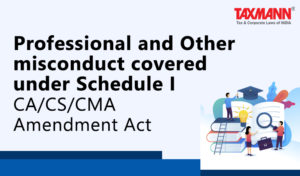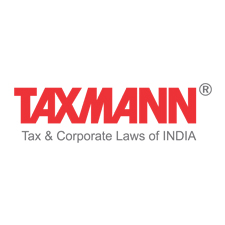Professional and Other misconduct covered under Schedule I | CA/CS/CMA Amendment Act
- Other Laws|Blog|
- 6 Min Read
- By Nidhi Rai
- |
- Last Updated on 28 May, 2022

Table of Contents
1. Professional and Other misconduct covered under Schedule I
1.1 Professional misconduct of member in practice
1.2 Professional misconduct by members of Institute in service
1.3 Professional misconduct of members (whether practicing or not)
Check out Taxmann's Guide to Chartered Accountants Act Cost Accountants Act & Company Secretaries Act which is a comprehensive book providing the amended, updated & annotated text of the Chartered Accountants Act, 1949, Cost and Works Accountants Act, 1959, and Company Secretaries Act, 1980 as amended by the Chartered Accountants, Cost and Works Accountants and Company Secretaries (Amendment) Act, 2022. It also includes a section-wise glance at amendments and a 50+ page short commentary.
1. Professional and Other misconduct covered under Schedule I
First Schedule of CA, CMA and CS Act covers professional misconducts which are comparatively less serious. Some important provisions are as follows.
1.1 Professional misconduct of member in practice
Part I of First Schedule lists items of professional misconduct of practicing member as follows.
Allowing other person to practice in his name – Allowing any person to practice in his name as a CA/CMA/CS unless such person is also a CA/CMA/CS in practice and is in partnership with or employed by him is a professional conduct – Item 1 of Part I of First Schedule.
Paying commission or brokerage – Paying or allowing or agreeing to pay or allow, directly or indirectly, any share, commission or brokerage in the fees or profits of his professional business, to any person other than a member of the Institute or a partner or a retired partner or the legal representative of a deceased partner, or a member of any other professional body or with such other persons having such qualifications as may be prescribed, for the purpose of rendering such professional services from time to time in or outside India is a professional misconduct. – In this item, “partner” includes a person residing outside India with whom a chartered accountant in practice has entered into partnership which is not in contravention of item (4) of this Part is misconduct – item 2 of Part I of First Schedule.
Accepting share of profit of professional work with non-member – Accepting or agreeing to accept any part of the profits of the professional work of a person who is not a member of the Institute is misconduct. However, a member can enter into profit sharing or other similar arrangements, including receiving any share commission or brokerage in the fees, with a member of such professional body or other person having qualifications, as is referred to in item (2) of Part I is professional misconduct- item 3 of Part I of First Schedule.
Entering into partnership with non member, unless permitted – Entering into partnership, in or outside India, with any person other than a CA/CMA/CS in practice or such other person who is a member of any other professional body having such qualifications as may be prescribed, including a resident who but for his residence abroad would be entitled to be registered as a member under section 4(1)(v) of Act or whose qualifications are recognised by the Central Government or the Council for the purpose of permitting such partnerships is professional misconduct- item 4 of Part I of First Schedule.
Seeking business from employee or partner is permissible – Item 5 of Part I of First Schedule states that securing, either through the services of a person who is not an employee of such practising member (CA, CMA or CS) or who is not a partner or by means which are not open to a practising member (CA, CMA or CS as the case may be), any professional business is a professional misconduct.
Putting it negatively, securing professional business through employee or another partner is not a professional misconduct. Only securing business through a third person will be treated as professional misconduct.
Soliciting clients or professional work through circular, advertisement, interview etc. – Soliciting clients or professional work through circular, advertisement, interview etc. is professional misconduct under item 6 of Part I of Schedule I.
In Rajendra V Pai v. Anex Fernandes 2002 AIR SCW 1777, it was held that soliciting business is offence and Advocate was suspended from practice for 7 years. [Lenient view was taken as it was his first offence].
One professional can seek professional work from another if from same Institute– As per proviso (i) to item 6 of Part I of First Schedule one professional can request or invite another member in the same field (e.g. A practicing CA can request or invite another practicing CA or a practicing CMA can request or invite another practicing CMA). This will not be treated as professional misconduct. (When multi-disciplinary firms are permitted, such restriction that one can solicit business only from member of his own institute carries little sense).
Practising Member can respond to enquiries or tenders – As per proviso (ii) to item 6 of Part I of First Schedule to all the three Acts, a practising member can respond to tenders or enquiries issued by various users of professional services or organisations, and secure professional work as a consequence.
Undercutting is not offence – Item 12 of part I of First Schedule as existing prior to 2006 provided that accepting a position as auditor/cost accountant/Company Secretary previously held by some other person as auditor/cost accountant/Company Secretary in such conditions as to constitute an undercutting is a professional misconduct. This item finds no place in the first schedule now, probably because now tendering is permitted. Thus, a member of Institute can freely quote lower fees without any fear.
Circulation of write up permissible – Proviso to item 7 of Part I of First Schedule provides that a practising member can advertise through a write up setting out the services provided by him or his firm and particulars of the firm, subject to such guidelines as may be issued by Council of the Institute.
Written communication to earlier practising member required – Item 8 of Part I of First Schedule provides that a practising member cannot accept position of auditor, cost accountant or Company Secretary without first communicating with earlier practicing member in writing.
Mere communication is required. It is not necessary to obtain his NOC – Ssay and Associates v. ICAI [2019] 110 taxmann.com 132 = 267 taxman 370 (Del HC).
Client can change the advocate if he has lost faith in the counsel. The advocate cannot refuse giving ‘no objection certificate’ on the ground that his fees are not paid. It cannot be a pre-condition for giving his consent. Until the proceedings are concluded, the advocate cannot insist on payment of fees. – C S Venkatasubramanian v. SBI (1997) 1 SCC 254.
Charging fees based on percentage of profits or contingent upon an event – Charging fees based on percentage of profits or contingent upon the findings or the results of professional employment is professional misconduct, unless permitted under Regulations – Item 10 of Part I of First Schedule.
Payment of remuneration to advocate depending upon winning the case or as percentage of amount recovered due to litigation is void, as it amounts to gambling on litigation – Ganga Ram v. Devi Das (1907) Punj Rec No. 61 * In the matter of Mrs. G Advocate AIR 1954 SC 557 = 56 Bom LR 838. [Such Contract is permitted in USA, but not in UK or India].
Engaging in any business or profession other than practicing CA/CMA/CS– Engaging in any business or profession other that practicing CA/CMA/CS without permission of Council is professional misconduct – Item 11 of Part I of First Schedule.
Engaging in business through companies, trusts and firms is professional misconduct – ICAI v. Subodh Gupta (2017) 246 taxman 64 = 79 taxmann.com 9 (Del HC DB).
Getting actively involved in affairs of the company where he is a director is a misconduct – Council of ICAI v. Praveen Kumar Katyal, FCA – (2011) 203 Taxman 260 = 15 taxmann.com 271 (Del HC DB).
Engaging actively in business of a company as a director without permission of ICAI is a professional misconduct – Gulshan Rai v. ICAI (2011) 201 Taxman 285 = 13 taxmann.com 45 (Del HC DB).
A practising member can be director in a company but not MD/WD, without approval of Council– Proviso to Item 11 of Part I of First Schedule makes it clear that a practising member can be director of a company if he or his partner does not have interest in such company as accountant/cost accountant/secretary. If interest is other than as ‘accountant, cost accountant or secretary’, there is no restriction.
He cannot receive salary but can accept sitting fees to attend Board and Committee meetings of company.
However, a practising member cannot be Managing Director or Whole time Director in a company without specific permission from Council. These restrictions do not apply to employed member.
A CA can be director of a company as a director who is not drawing salary from company cannot be said to be ‘engaged in any business of profession other than profession of Chartered Accountant – Yogeshwari Kumari v. Institute of Chartered Accountants of India (2010) 104 SCL 572 (Del HC DB).
1.2 Professional misconduct by members of Institute in service
Paying or allowing any share in the emoluments of employment or accepting any commission or gratification is professional misconduct by members of Institute in service – Part II of First Schedule.
1.3 Professional misconduct of members (whether practicing or not)
Professional misconduct of members (whether practicing or not) are given in Part III of First Schedule to CA, CMA and CS Act, as follows.
Acting as Fellow of Institute even if not – Acting as Fellow of Institute even if the person is not fellow member of Institute is professional misconduct – Item 1 of Part III of First Schedule to all three Acts.
Non-compliance of requirements of Institute/Council – A member not supplying information or not complying with the requirements asked for, by Institute, Council or any of its Committees, Director (Discipline), Board of Discipline, Quality Review Board of Appellate Authority can be penalised for professional misconduct (Item 2 of Part III of First Schedule to all three Acts). The provision applies to practising as well as employed members.
Giving false information in write up or in response to tenders or enquiries – Knowingly giving false information while responding to tenders or enquiries or while advertising through write up, or soliciting clients or professional work or advertising professional attainments or services will be a professional misconduct, as per Item 3 of Part III of First Schedule to all three Acts.
Disclaimer: The content/information published on the website is only for general information of the user and shall not be construed as legal advice. While the Taxmann has exercised reasonable efforts to ensure the veracity of information/content published, Taxmann shall be under no liability in any manner whatsoever for incorrect information, if any.




 CA | CS | CMA
CA | CS | CMA
